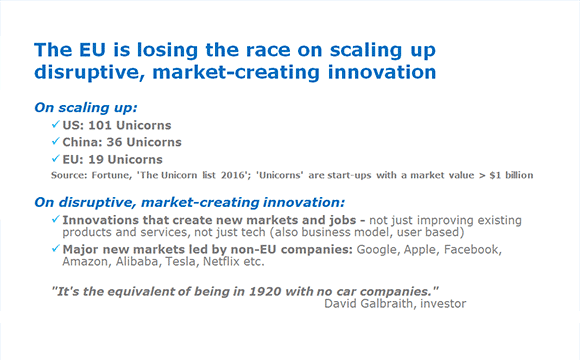You know Europe is getting serious about creating its own Silicon Valley when Brussels’ policymakers turn to crowdsourcing innovation ideas.
European Commission officials announced this week they’re creating a European Innovation Council, and they’re going hat-in-hand to the startup entrepreneurs, techies and VCs they’ve pretty much scorned until now in favor of conventional business.
 The Call for Ideas seeks proposals “from all interested parties, including innovators who do not usually participate in EU support schemes ….” according to a statement on the EC Innovation and Research website. (Emphasis ours.)
The Call for Ideas seeks proposals “from all interested parties, including innovators who do not usually participate in EU support schemes ….” according to a statement on the EC Innovation and Research website. (Emphasis ours.)
The goal? To figure out how the European Innovation Council can be constituted to improve Europe’s capacity “to generate and scale up breakthrough innovations.”
To their credit, EC officials admit that though all the fundamental pieces are in place for Europe to compete with the U.S. digital juggernaut, it ain’t happenin.’ While Europe has cities full of young startup innovators, the continent has produced no disruptive innovation on par with Amazon, Facebook, Apple, Youtube or even Dropbox, only knock-offs of American concepts such as Berlin-based Rocket Internet.
The EC’s reasoning is that Europe lags behind in disruptive innovation and in scaling up startups into job-creating, tax-paying businesses, and a European Innovation Council could contribute to solving this problem.
From the clarion call to action:
Carlos Moedas, Commissioner for Research, Science and Innovation said: “Europe has excellent science, but we lack disruptive market-creating innovation. This is what is needed to turn our best ideas into innovative products and services that provide growth and jobs. I want to test the idea of creating a European Innovation Council, which could replicate for entrepreneurs what the European Research Council is doing for Europe’s best researchers. Therefore I am launching a Call for Ideas so Europe’s innovation community can tell us what they think an EIC could improve.”
In the great European tradition, this whole call for ideas will fall under yet another bureaucratic structure, Horizon 2020, the framework program for the EC’s research and innovation bureaucracy. That said, there does now seem to be a new urgency, with the EC website stating bluntly, “The EU is losing the race on scaling up disruptive, market-creating innovation.” If you want to reverse that, you can weigh in here with your ideas. The deadline for responses is 29 April 2016.
Okay, time for a reality check. EC officials need to take a giant step back and look at the U.S. model, which is no model at all.
As Dispatches has pointed out repeatedly, Silicon Valley was never a public-sector initiative, and there were no innovation councils, commissions or career bureaucrats.
There was a fortuitous accident of geography, with high-tech companies clustering around Stanford University after World War II. Into that creative maelstrom, fate introduced mercurial tech giants such as Robert Noyce and Andy Grove, the guys who invented integrated circuity, and Steve Wozniak and Steve Jobs, the guys who figured out what to do with it. EC officials need to study closely the period Jobs was building Apple because that was a time of pure chaos. Jobs gathered together incredibly talented people, then wrangled sufficient capital to build the Macintosh. In five short years, it all blew up. Apple’s board made a sharp right turn, replacing Jobs with a CEO from a soft drink company because Jobs was notoriously difficult. Then, it all came back together again and during Jobs’ return, Apple introduced iPhones and iPods and every kind of technical, digital and retail innovation.
That kind of uniquely American voodoo anarchy can’t be bottled.
BUT, there are all sorts of instances of governments bringing together the talent that then spun off technical disruption, the most obvious being the creation of the National Aeronautics and Space Administration after President Kennedy announced we were going to the moon, and all the technology that’s come out of space exploration. That likely won’t apply to Europe because 27 countries tend to work at cross-purposes, not in unison. Witness Airbus versus Boeing.
My opinion as someone betting everything Europe will be the next tech capital? There is sufficient capital and educational infrastructure in France, Germany, the Netherlands and Sweden to launch 10,000 wildly successful startups. What there’s not is readily available tech talent or a risk-capital culture.
European officials, you need to do three things:
1 – If you want to do something to encourage startup success, do less, not more. Get rid of the bureaucratic and protectionist obstacles to innovation. Stop trying to be the digital nanny. Billions of people use the internet and expect everything to be free. But nothing is ever free. Internet users pay the toll now by making themselves available to marketers and advertisers. You can’t expect to have total online privacy and free access to a universe of knowledge and social media services. If EU officials try to change that, they’re headed for disaster. If you add to that restrictions on online commerce across borders, Europe will end up as the digital equivalent of North Korea.
2 – If you want to do something, be clever. Go to the U.S. and start a formal grassroots-level effort to recruit tech talent and entrepreneurs just as the NBA steals away all of Europe’s top hoops talent. Do what the most successful salespeople and pro sports scouts do … get out and prospect.
3- If you want to do something, create a tax structure that rewards high-net-worth individuals for taking their money out of Deutsche Bank and HSBC and using it to fund startups.
Though in the U.S., my politics are viewed as liberal-left, I am a free-market guy. There are no guarantees in life … except this one:
Less government interference always guarantees greater private-sector success.
Co-CEO of Dispatches Europe. A former military reporter, I'm a serial expat who has lived in France, Turkey, Germany and the Netherlands.















